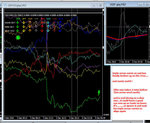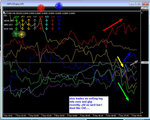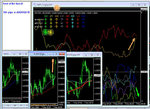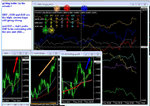NVP
Guest Author
- Messages
- 37,966
- Likes
- 2,158
just read a great article from Lance beggs below......saying you are a part time / full time trader in the forex market sounds cools doesnt it ?........impresses everyone eh ?
just dont attach yourself toooo much to it or believe your hype - or you may regret it as reality bites hard today , tomorrow or when its ready...........we are not doctors or lawyers with regular income - and there are no pensions or guarantees in this game....its law of the jungle 24 hours a day
find a method that suits you, practice until your trigger fingers bleed, take no prisoners and be confident when the time to enter or exit is shown..........and constantly refine and improve everything you do in trading
eye of the tiger.............
N
What We Fear In Trading Is...
A key component of my trading documentation is my Lessons Learnt Journal - a collection of insights organised into numerous trading-related categories. It creates a great tool for both formal review and learning, and also for casual reading whenever I've got a spare few minutes.
Within this invaluable resource, and amongst the numerous market structure and price action insights, is my favourite "lesson learnt"... a short psychological gem...
What we fear in trading is the loss of our self.*
What does this mean?
Our definition of who we are is built up through our achievements, our successes or failures, our possessions, our victories, our job, our financial situation, our families and friends perception of us, our belief as to others perceptions of ourselves, and so on.
This is our self-image. It's how we perceive ourselves as a person.
Our current life circumstances are a direct result of our self-image.
And our future decisions and actions will be further influenced by it, as we act in order to reinforce our self-image, or to resist or avoid any potential threat to our self-image.
This is important... subconscious decisions and actions will be taken in order to protect our self-image from any perceived threat.
For most novice traders, trading failure IS a threat to their self-image.
We may see ourselves as confident, intelligent, successful people. We expect success at new ventures, especially one so potentially life-changing as trading. But we also subconsciously recognise that the market environment is unlike any other we've worked in before, and contains risk along with significant potential to fail at this venture. To the novice trader, who has not mastered their own trading psychology or mindset, trading failure means that perhaps they're not confident, intelligent, successful people. Maybe their self-image was an illusion, or a lie? Maybe they'll never be able to attain wealth? Maybe they're not able to provide for their family? Maybe they won't ever be free from the slavery of a nine to five job? Maybe their partner won't love them any more? Maybe they won't be worthy of self-love any more?
Every loss contains within it the seeds of potential failure. Not just loss of funds, but proof that our self-image is a lie; a fragile idea that quite possibly has no basis for reality. In every trade... we risk our belief about who we.
Recognising this threat, our subconscious will act to protect us from potential loss. Some of us become busy preparing to trade; avoiding risk through planning and researching rather than ever engaging the live market. Others fail to plan, so that they can't blame themselves for the likely failure. Others actively seek out other sources of blame - their broker who hunts stops; their chat-room moderator who obviously is a fraud. Others hesitate on entry, in order to avoid what could be another bad trade. Others hold trades that have moved through their stop, in the desperate hope they'll come back to breakeven, or even profits. And others exit profitable trades earlier than defined in their plan, to secure these profits before the unpredictable market can turn around and take away their money.
We make these decisions and actions to protect ourselves from perceived threat; but we do so completely unaware of their unintended consequences. The fact that our subconscious actions, taken to protect us from loss, act instead to produce the very failure that we seek to avoid.
Trading can be a cruel game (for the novice).
The answer... TRUST - the subject of another article.
* Source: Lessons Learnt entry adapted from the quote "You cannot separate any fear that you have from the fear of the loss of your self" by Guy Finley in his spirituality presentation, "Timeless Mind".
just dont attach yourself toooo much to it or believe your hype - or you may regret it as reality bites hard today , tomorrow or when its ready...........we are not doctors or lawyers with regular income - and there are no pensions or guarantees in this game....its law of the jungle 24 hours a day
find a method that suits you, practice until your trigger fingers bleed, take no prisoners and be confident when the time to enter or exit is shown..........and constantly refine and improve everything you do in trading
eye of the tiger.............
N
What We Fear In Trading Is...
A key component of my trading documentation is my Lessons Learnt Journal - a collection of insights organised into numerous trading-related categories. It creates a great tool for both formal review and learning, and also for casual reading whenever I've got a spare few minutes.
Within this invaluable resource, and amongst the numerous market structure and price action insights, is my favourite "lesson learnt"... a short psychological gem...
What we fear in trading is the loss of our self.*
What does this mean?
Our definition of who we are is built up through our achievements, our successes or failures, our possessions, our victories, our job, our financial situation, our families and friends perception of us, our belief as to others perceptions of ourselves, and so on.
This is our self-image. It's how we perceive ourselves as a person.
Our current life circumstances are a direct result of our self-image.
And our future decisions and actions will be further influenced by it, as we act in order to reinforce our self-image, or to resist or avoid any potential threat to our self-image.
This is important... subconscious decisions and actions will be taken in order to protect our self-image from any perceived threat.
For most novice traders, trading failure IS a threat to their self-image.
We may see ourselves as confident, intelligent, successful people. We expect success at new ventures, especially one so potentially life-changing as trading. But we also subconsciously recognise that the market environment is unlike any other we've worked in before, and contains risk along with significant potential to fail at this venture. To the novice trader, who has not mastered their own trading psychology or mindset, trading failure means that perhaps they're not confident, intelligent, successful people. Maybe their self-image was an illusion, or a lie? Maybe they'll never be able to attain wealth? Maybe they're not able to provide for their family? Maybe they won't ever be free from the slavery of a nine to five job? Maybe their partner won't love them any more? Maybe they won't be worthy of self-love any more?
Every loss contains within it the seeds of potential failure. Not just loss of funds, but proof that our self-image is a lie; a fragile idea that quite possibly has no basis for reality. In every trade... we risk our belief about who we.
Recognising this threat, our subconscious will act to protect us from potential loss. Some of us become busy preparing to trade; avoiding risk through planning and researching rather than ever engaging the live market. Others fail to plan, so that they can't blame themselves for the likely failure. Others actively seek out other sources of blame - their broker who hunts stops; their chat-room moderator who obviously is a fraud. Others hesitate on entry, in order to avoid what could be another bad trade. Others hold trades that have moved through their stop, in the desperate hope they'll come back to breakeven, or even profits. And others exit profitable trades earlier than defined in their plan, to secure these profits before the unpredictable market can turn around and take away their money.
We make these decisions and actions to protect ourselves from perceived threat; but we do so completely unaware of their unintended consequences. The fact that our subconscious actions, taken to protect us from loss, act instead to produce the very failure that we seek to avoid.
Trading can be a cruel game (for the novice).
The answer... TRUST - the subject of another article.
* Source: Lessons Learnt entry adapted from the quote "You cannot separate any fear that you have from the fear of the loss of your self" by Guy Finley in his spirituality presentation, "Timeless Mind".




